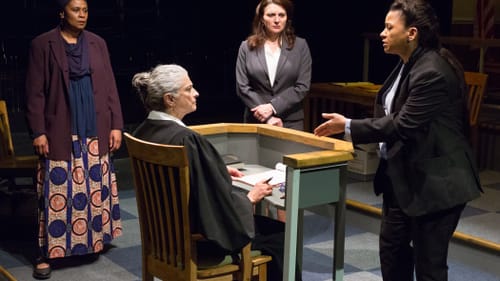Stay in the Loop
BSR publishes on a weekly schedule, with an email newsletter every Wednesday and Thursday morning. There’s no paywall, and subscribing is always free.
Shine a light
People's Light presents Karen Hartman's 'Project Dawn'

I'm skeptical of "based on a true story" entertainments, perhaps because I have some small knowledge of how difficult making an entirely fictional story feel genuine can be. But Project Dawn, Karen Hartman's new play at People's Light & Theatre Company and a National New Play Network rolling world premiere, adds to its considerable impact by being based on the playwright's immersive research of a real situation.
Hartman studied a revolutionary Philadelphia court dedicated to rehabilitating career prostitutes instead of punishing them. The play's gritty reality shows that sex workers are truly victims who need dignity and compassion, not continued trauma. Project Dawn is the first in People's Light's New Play Frontiers Residency and Commission program, pairing playwrights with local subjects.
Realistic court procedures
Project Dawn immerses us in the underfunded court's procedures. Antoinette LaVecchia plays Gwen, the defense lawyer who created the court but finds it, along with her four children and her other jobs, so personally consuming that she's overwhelmed. District attorney Kyla (Yvette Ganier) empathizes. They're more partners than adversaries, working with Judge Kaplan (Janis Dardaris), clerk Nia (Susanna Guzman), and social worker Ruth (Melanye Finister) to aid each former prostitute through required sobriety (most are substance abusers) to housing, jobs, medical care, and eventual independence. Idealistic intern Noelle (Claire Inie-Richards) joins the team, and Sister Carol (Danielle Skraasted) runs a home for recovering women. Nadira Beard plays the imposing Bailiff.
Scenic designer Jessica Ford's three-tiered set creates a small, modern courtroom with the audience on three sides. Its blonde wood and light-blue floors offer an antiseptic juxtaposition to the women's miseries. Ford builds in a few clever extras, including a ladies' room and an outdoor scene revealed by a wall that glides away. She also designed the costumes, which accomplish quick changes adroitly. Dennis Parichy's expert lighting occasionally surprises by breaking from stark reality to isolate a single character's inner feelings

This friendly and supportive team is dedicated to helping repeat offenders, whom they love and protect, though some are exasperating and a few, despite their best efforts, will not accept rehabilitation. "We must be consistent with the hug and the hammer," Kyla reminds everyone.
Theatrical flourish
Their needy clients are played by the same seven women, each at a different stage of the recovery program; the actors transform instantly and effortlessly, often just donning, removing, or adjusting a coat or scarf and slipping into a new accent or speech pattern.
Skraasted plays outspoken Tracy, who struggles to follow the "no texting, no selfies, no gum" court rules. "There's no feeling on Earth better than being young and high," she muses. Inie-Richards is desperate, wailing teen Ashlee, kidnapped into prostitution but now facing charges. Finister plays proud Muslim Krystal. Guzman's Lola fears deportation. Ganier's Shondell graduates, hoping to finally "do grandmother things." LaVecchia’s Cassie hopes for a hip operation that’s threatened by the drugs dulling her pain. Dardaris shines as exultant graduate Bonnie, cautioning everyone to "have respect for the demon" in a fiery speech — and proves the point later in a harrowing scene.
Admiration for the cast's impressive skills and director Abigail Adams's brilliant work swells alongside the horrors revealed in Hartman's script. So much is covered in the play's two hours: the lack of funding and consideration from Philadelphia's government, including an eloquent defense of justice's least respected position, parole officer; the longtime injustice and irrationality of arresting prostitutes but not johns; the myth that prostitution is a viable career choice for women; the many challenges of finding pockets of mercy and hope in a system cobbled together to mete out punishment; and, of course, 14 distinct, vividly real characters' stories.
Judge Kaplan encourages a woman to "find a way to take care of yourself that is real." Project Dawn says society must find a way to take care of prostitution's victims that is real. Hopefully, this beautifully crafted, lovingly performed play moves us toward that neglected goal.
What, When, Where
Project Dawn. By Karen Hartman, Abigail Adams directed. Through July 9, 2017, at the People's Light & Theatre Company, 39 Conestoga Road, Malvern, Pennsylvania. (610) 644-3500 or peopleslight.org.
Sign up for our newsletter
All of the week's new articles, all in one place. Sign up for the free weekly BSR newsletters, and don't miss a conversation.
 Mark Cofta
Mark Cofta